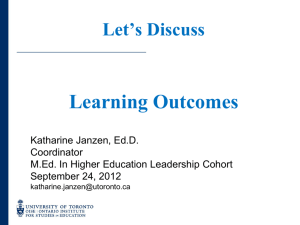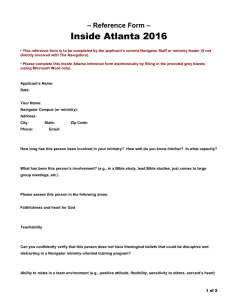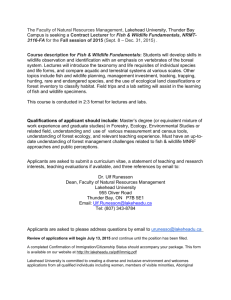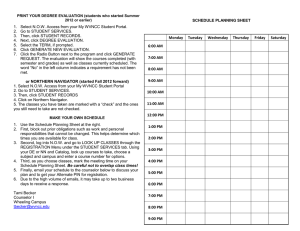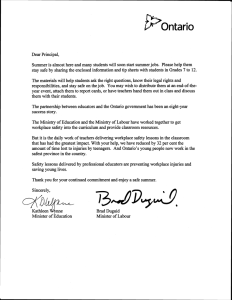EDUC 4033 YAO and YBO
advertisement
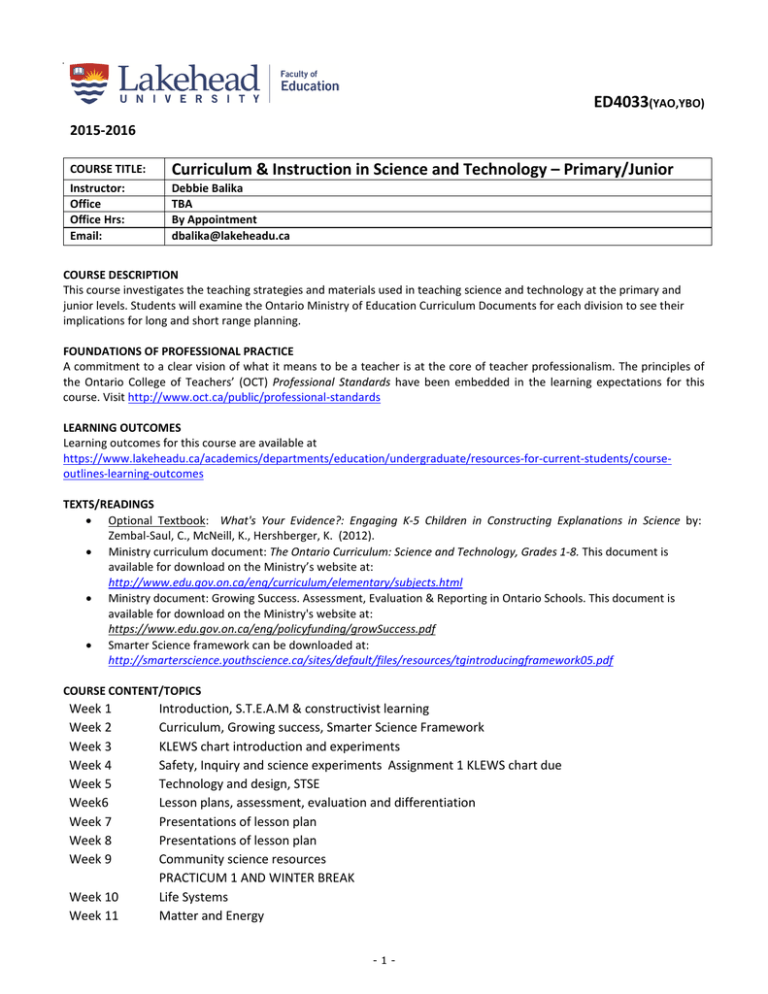
ED4033(YAO,YBO) 2015-2016 COURSE TITLE: Instructor: Office Office Hrs: Email: Curriculum & Instruction in Science and Technology – Primary/Junior Debbie Balika TBA By Appointment dbalika@lakeheadu.ca COURSE DESCRIPTION This course investigates the teaching strategies and materials used in teaching science and technology at the primary and junior levels. Students will examine the Ontario Ministry of Education Curriculum Documents for each division to see their implications for long and short range planning. FOUNDATIONS OF PROFESSIONAL PRACTICE A commitment to a clear vision of what it means to be a teacher is at the core of teacher professionalism. The principles of the Ontario College of Teachers’ (OCT) Professional Standards have been embedded in the learning expectations for this course. Visit http://www.oct.ca/public/professional-standards LEARNING OUTCOMES Learning outcomes for this course are available at https://www.lakeheadu.ca/academics/departments/education/undergraduate/resources-for-current-students/courseoutlines-learning-outcomes TEXTS/READINGS • Optional Textbook: What's Your Evidence?: Engaging K-5 Children in Constructing Explanations in Science by: Zembal-Saul, C., McNeill, K., Hershberger, K. (2012). • Ministry curriculum document: The Ontario Curriculum: Science and Technology, Grades 1-8. This document is available for download on the Ministry’s website at: http://www.edu.gov.on.ca/eng/curriculum/elementary/subjects.html • Ministry document: Growing Success. Assessment, Evaluation & Reporting in Ontario Schools. This document is available for download on the Ministry's website at: https://www.edu.gov.on.ca/eng/policyfunding/growSuccess.pdf • Smarter Science framework can be downloaded at: http://smarterscience.youthscience.ca/sites/default/files/resources/tgintroducingframework05.pdf COURSE CONTENT/TOPICS Week 1 Week 2 Week 3 Week 4 Week 5 Week6 Week 7 Week 8 Week 9 Week 10 Week 11 Introduction, S.T.E.A.M & constructivist learning Curriculum, Growing success, Smarter Science Framework KLEWS chart introduction and experiments Safety, Inquiry and science experiments Assignment 1 KLEWS chart due Technology and design, STSE Lesson plans, assessment, evaluation and differentiation Presentations of lesson plan Presentations of lesson plan Community science resources PRACTICUM 1 AND WINTER BREAK Life Systems Matter and Energy -1- Week 12 Week 13 Week 14 Week 15 Week 16 Week 17 Week 18 Structures Earth and space systems Culminating task assignment peer review Cross curricular and integrated learning Alternate conceptions, inclusion Mechanical advantages, Simulation Science PEOE Fair ASSIGNMENTS AND EVALUATION Assignment 1: KLEWS chart & reflection (20%) Assignment 2 : Lesson plan (15%) (10% lesson plan & 5% presentation) Assignment 3: Culminating task (20%) Assignment 4: Unit table (25%) Assignment 5: PEOE Fair (5%) Professional Practice (15%) LAKEHEAD UNIVERSITY and/or FACULTY OF EDUCATION REGULATIONS/POLICIES INCOMPLETE STANDING (University Regulation, V Standing) http://navigator.lakeheadu.ca/Catalog/ViewCatalog.aspx?pageid=viewcatalog&catalogid=21&chapterid=3506&loaduseredits =False TIMELY FEEDBACK (University Regulation XII) http://navigator.lakeheadu.ca/Catalog/ViewCatalog.aspx?pageid=viewcatalog&catalogid=21&chapterid=3506&loaduseredits =False 25% feedback for term courses → Fall term = October 9, 2015 → Winter term = February 12, 2016 30% feedback for year courses → Yearlong = January 22, 2016 ACADEMIC MISCONDUCT (University Regulation, IX Academic Misconduct) http://navigator.lakeheadu.ca/Catalog/ViewCatalog.aspx?pageid=viewcatalog&catalogid=21&chapterid=3506&loaduseredits =False THE FACULTY OF EDUCATION ASSESSMENT RUBRIC http://education.lakeheadu.ca/undergraduate/uploads/Microsoft%20Word%20-%20Professional%20Grading%20Policy-1.pdf Expectations The ability to learn, understand, and retain knowledge has been demonstrated through the undergraduate degree required for entry into the Professional Year. The focus of the Professional Year is on building understanding of the issues and complexities of the teaching and learning process, and on gaining the skills necessary for becoming a successful teacher. To that end: 1. Attendance is an expectation. Courses are based on reflection, discussion, and interaction, much of which takes place in class. Courses may have a set limit on the number of sessions that can be missed for ANY reason. These permissible absences should be saved for emergencies. Students who do not attend regularly will be removed from the program. 2. Requirements on the course outline will be used for assessment. The course outline and assessment rubric make expectations and deadlines explicit. Late assignments are accepted only under rare, documentable circumstances. -2- Students cannot redo assignments, rewrite exams, or make additional submissions to boost a mark once a summative assessment has taken place. 3. Assessment is a reflection of academic rigour. Only in instances where there is unusual disparity among marks or abnormal inconsistency in outcomes will an instructor re-examine a final assessment. EDUCATION ACADEMIC REGULATIONS http://navigator.lakeheadu.ca/Catalog/ViewCatalog.aspx?pageid=viewcatalog&catalogid=21&chapterid=3497&topicgroupid= 11173&loaduseredits=False Advisement: CELL PHONES, PDAs etc. The Faculty of Education cautions Professional Year Candidates that the use of cell phones, personal digital assistants (PDAs), handhelds, etc., in class for personal communications (whether checking voice mail, reading or sending text messages, or making conventional telephone calls) is professionally unacceptable in the context of a class or while a formal presentation is in progress. Moreover, since digital image capturing devices in cameras, cell phones, and PDAs have the potential to be used in a manner that violates the privacy of instructors and students, the Faculty of Education requests that such devices be used only with the prior permission of the person(s) to be photographed. Most Canadian schools require that cell phones, etc. not be used during hours of instruction. The Faculty of Education requests that students power off or mute their PDAs during classes, presentations, tests and exams, and that, while on practicum, teacher candidates not use them in a way that contravenes the school's or board's protocols. -3-
